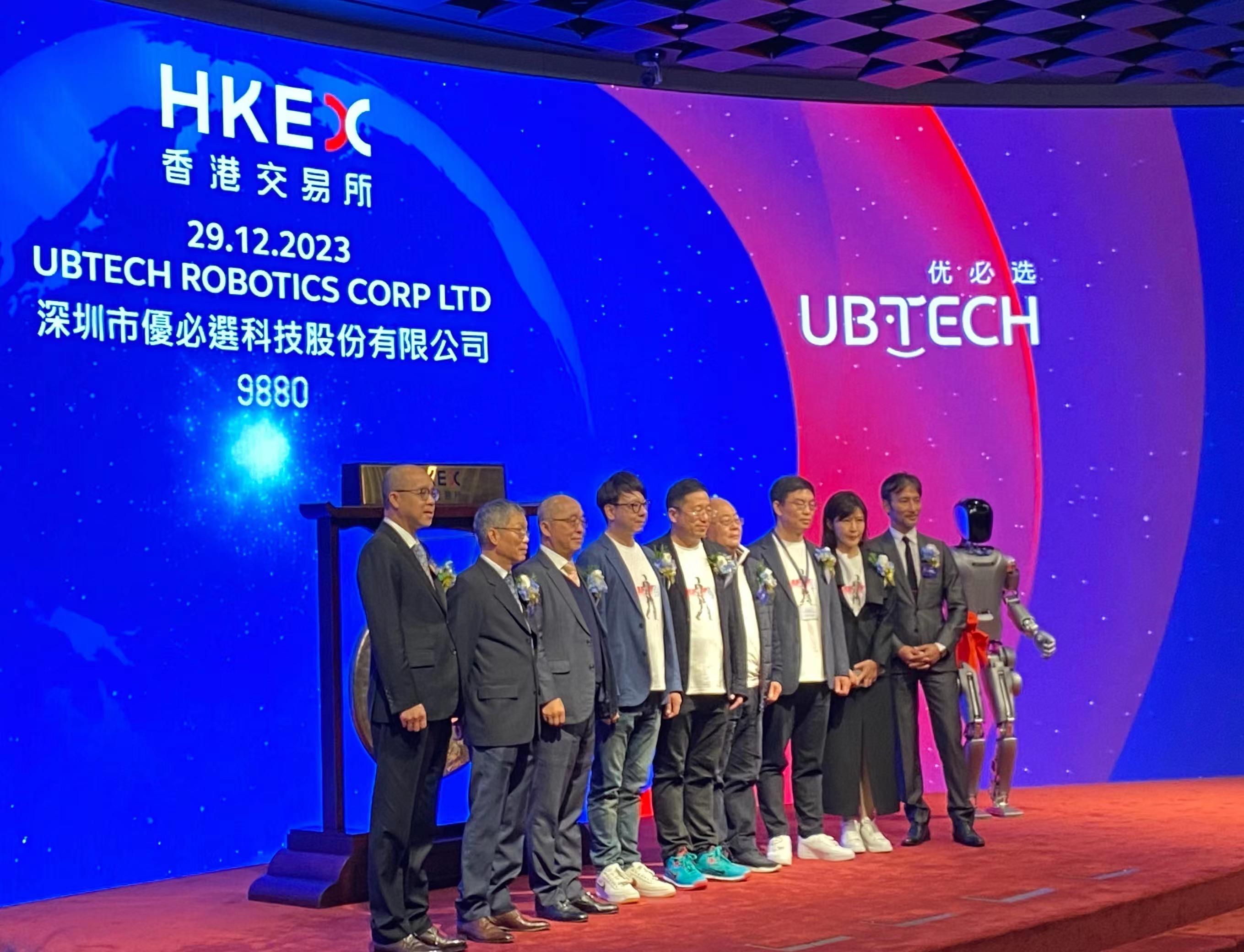 UBTech's 170-cm-tall humanoid robot walks step by step to the center of the HKEX Connect Hall stage and strikes the gong together with the firm’s founder and CEO Zhou Jian on Dec 29, 2023 as the firm's listing, the year’s final initial public offering in Hong Kong, created a stir. (PROVIDED TO CHINA DAILY)
UBTech's 170-cm-tall humanoid robot walks step by step to the center of the HKEX Connect Hall stage and strikes the gong together with the firm’s founder and CEO Zhou Jian on Dec 29, 2023 as the firm's listing, the year’s final initial public offering in Hong Kong, created a stir. (PROVIDED TO CHINA DAILY)
UBTech Robotics, a Shenzhen-based maker of humanoid robots, debuted in the Hong Kong Stock Exchange on Friday after raising HK$1 billion amid a lackluster investment market.
The company’s share edged up 0.9 percent from its issue price to HK$90.85 ($11.63), giving it a market capitalization of HK$38 billion.
The Hang Seng Index has retreated by more than 15 percent so far this year, while average daily turnover on the stock market shrank 16 percent year-on-year to HK$115.5 billion in the first six months
UBTech’s listing, the year’final initial public offering, created a stir as its 170-cm-tall humanoid robot walked step by step to the center of the Connect Hall stage and struck the gong together with the firm’s founder and CEO Zhou Jian. This also marked the first time that investors were able to trade a Chinese humanoid robot developer at the secondary market.
READ MORE: Intelligent robot maker raises funds as demand grows
Domestic market conditions should be favorable for UBTech’s expansion. China’s smart service robotic products and services market is estimated to reach 183.2 billion yuan at a compound annual growth rate of 23.5 percent by 2028, outstripping global market growth, according to research firm Frost & Sullivan, which stated that last year the firm was China’s largest provider of educational smart robotic products and services in revenue.
However, UBTech has struggled to make a profit. It logged a net loss of 987.4 million yuan last year, widened from 917.5 million yuan in 2021. Losses in the first half of 2023 were 547.9 million yuan.
The rising losses came alongside the company’s heavy investments in research and development, which accounted for 85.9 percent of its total expenditure for the first six months of the year.
Sales of educational and logistics robots were the major source of its income, contributing at least 77 percent to its annual revenue from 2020 to 2022.
Nevertheless, Zhou said the company will target industrial application scenarios and is testing its products with a new energy vehicle manufacturer. Commercialization is expected to start as soon as next year.
In contrast to robotic applications for family and consumer use, which require far more agile human-machine interaction needs, large-scale commercialization of humanoid robots for industrial manufacturing is highly feasible, said Zhou, who added that he expects rising demand within three years.
UBTech’s public share sale came as Hong Kong’s IPO market had cooled. The latest data from the global consulting firm EY suggests that the number of IPOs declined 19 percent this year compared with 2022. Moreover, funds raised plunged 59 percent to its lowest level in the last 20 years.
 Officials pose for a photograph after Shenzhen-based maker of humanoid robots UBTech Robotics debuted in the Hong Kong Stock Exchange, Dec 29, 2023. (LIU YIFAN / CHINA DAILY)
Officials pose for a photograph after Shenzhen-based maker of humanoid robots UBTech Robotics debuted in the Hong Kong Stock Exchange, Dec 29, 2023. (LIU YIFAN / CHINA DAILY)
The stock market has also been reeling from bearish market sentiment. The Hang Seng Index has retreated by more than 15 percent so far this year, while average daily turnover on the stock market shrank 16 percent year-on-year to HK$115.5 billion in the first six months.
UBTech sold 11.3 million new shares at a unit price of HK$90 per share — the lower end of its target range of HK$86 to HK$116.
The IPO proceeds will be mainly used for research and development, repayment of bank loans, brand building and optimizing operational efficiency, the company’s prospectus said.
READ MORE: Researchers: Robot makers slow to address danger risk
China Great Wall Securities said in a research report that UBTech’s humanoid robot development is expected to accelerate as the market is set to boom thanks to the improvement in intelligent and autonomous movement ability.
Vivian Chan, an analyst at Zhongtai Securities, said she held reservations and gave UBTech a “neutral” rating. Although the company is China’s leading robotics service company, and the market size will realize strong growth, its stock is not attractive given its small revenue scale and its loss-making status, she said.
Chan added that there is uncertainty about profit growth and both its gross profit margin and net profit margin are lower than average.


